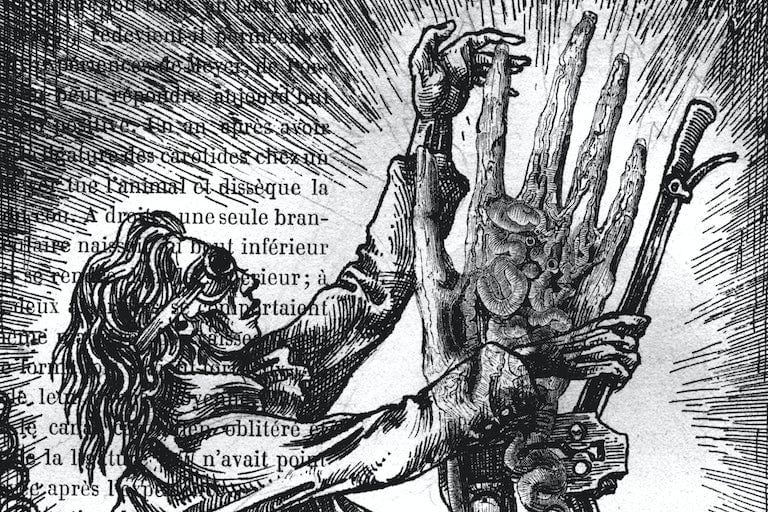As an English professor who is particularly interested in mythology and the role that stories play in helping us making meaning of our lives, I’m pretty attuned to noticing when such references show up and how they are utilized, whether in films or books.
Like many people, this past weekend I saw Oppenheimer, Christopher Nolan’s much anticipated film on the “father of the atomic bomb”, J. Robert Oppenheimer, the theoretical physicist who headed The Manhattan Project during World War II.
Nolan has explored myth, myth-making, and the power of stories to shape our personal and cultural realities in many of his other films, particularly in his Batman trilogy and Inception, and even though Oppenheimer is only his second film based on historical events (Dunkirk being the other), he still brings that mythological sensibility to the material.
Giver of Fire
It’s not too difficult, because the material lends itself to myth-making, particularly due to the fact that Nolan based the film in large part on the Pulitzer Prize winning Oppenheimer biography American Prometheus, written by Kai Bird and Martin J. Sherwin and published in 2005.
Nolan references this at the very beginning of the film, when the following words appear against the background of a roiling atomic mushroom cloud:
Prometheus stole fire from the gods and gave it to man. For this he was chained to a rock and tortured for eternity.
The myth of Prometheus comes to us from Greek mythology and first appeared in the writings of the poet Hesiod. In most versions of the story, Prometheus was a lesser god who was seen as a benefactor to mankind, in contrast to the mighty but petty Olympian gods who mostly just demanded worship from humans. After Prometheus steals fire from the gods and gives it to humanity, the angry Zeus orders that he is to be chained to a rock for all eternity, and that every day an eagle will come and eat his liver, only for it to be regenerated again every night.
The connection between Prometheus and Oppenheimer was first made, not in the 2005 biography, but in a 1945 issue of Scientific American, which wrote about Oppenheimer and his fellow scientists: “Modern Prometheans have raided Mount Olympus again and have brought back for man the very thunderbolts of Zeus”.
The main parallel that Oppenheimer’s biographers and Nolan also trace is the way in which Oppenheimer was treated by the United States government. He was initially hailed as a hero, but when he began to express doubt about his creation and opposition to more hawkish nuclear policies, he was branded a Communist sympathizer, disgraced, and had his security clearance revoked—made a scapegoat much like Prometheus.
But ScreenRant writer Cathal Gunning sees an even deeper level to the Prometheus parallels in Oppenheimer, and I saw it too:
Prometheus gifting humanity fire isn’t a straightforward, literal favor in the Greek myth. Fire can be seen to represent technology, scientific exploration, society or civilization, arts, and the humanities. With the gift of fire, humans could build communities and develop infrastructure but also destroy one another. Much like Oppenheimer’s nuclear tests paved the way for the arms race and Cold War that defined the coming decades, Prometheus’s decision brought humanity closer to the status of the Greek gods. However, in both cases, this decision was not necessarily the right one. The reason that an eagle was sent to eat Prometheus’s liver is that this organ represented emotion in Greek mythology.
Thus, Prometheus was tortured not just by a big bird eating his insides, but by the human cost of his gift. Fire built civilization which meant, by extension, the discovery also played a role in tribal division, the development of warfare, and eventually even the atom bomb. The impact of Prometheus’s actions was impossible for him to predict but, crucially, the legacy of his gift lasted forever. Prometheus was tortured by his decision to share his ingenuity with humanity, which is exactly what led Oppenheimer to oppose the development of the hydrogen bomb mere years after he was instrumental in the invention of its predecessor, the atom bomb.
Nolan seems to be drawing on this idea as well as he traces Oppenheimer’s eventual fall from grace at the hands of certain government officials in parallel to his own haunting visions of the future.
The way that Oppenheimer’s regret emerges in the film also shares similarities with another scientist of a more modern myth.
The Modern Prometheus
The mother of all tales of scientific caution is, of course, Mary Shelley’s Frankenstein, published in 1818. Interestingly, what most people probably don’t know is that Shelley was already making connections between Greek mythology and modern science, because the subtitle of Frankenstein is The Modern Prometheus.
While as far as I can tell Nolan makes no attempts to explicitly reference Frankenstein in his film, I can’t help but notice the parallels because it’s a text I’ve taught quite a lot in the past few years. It has become a parable that all other tales of scientific daring subconsciously allude to.
The parallel is most clearly seen in the scientists themselves, Oppenheimer and Victor Frankenstein, and how they behave before and after their scientific breakthroughs. Like Frankenstein, Oppenheimer is portrayed as a scientific genius at a young age, eagerly curious to uncover the deepest mysteries of the universe, but a bit naive to the implications of uncovering those mysteries. They both only realize after it’s too late what they have unleashed on the world. Victor is so obsessed with trying to uncover the mysteries of life and death that he doesn’t realize he’s creating a monster until the moment it comes to life:
I had worked hard for nearly two years, for the sole purpose of infusing life into an inanimate body. For this I had deprived myself of rest and health. I had desired it with an ardour that far exceeded moderation; but now that I had finished, the beauty of the dream vanished, and breathless horror and disgust filled my heart.
Similarly, in Oppenheimer the physicist continually retreats into theory when faced with the future implications of creating the atomic bomb. Only when he witnesses the horrific power of what he’s helped create does he start to have serious reservations.
Destroyer of Worlds
Perhaps the most famous anecdote related to Oppenheimer comes from an interview he did in 1965 when he was recalling the moment of the Trinity Test:
We knew the world would not be the same. A few people laughed, a few people cried. Most people were silent. I remembered the line from the Hindu scripture, the Bhagavad Gita; Vishnu is trying to persuade the Prince that he should do his duty and, to impress him, takes on his multi-armed form and says, "Now I am become Death, the destroyer of worlds." I suppose we all thought that, one way or another.
Wired writer James Temperton explains the larger context of this quote from the Hindu text:
The Bhagavad Gita is 700-verse Hindu scripture, written in Sanskrit, that centers on a dialog between a great warrior prince named Arjuna and his charioteer Lord Krishna, an incarnation of [the Hindu deity] Vishnu. Facing an opposing army containing his friends and relatives, Arjuna is torn. But Krishna teaches him about a higher philosophy that will enable him to carry out his duties as a warrior irrespective of his personal concerns. This is known as the dharma, or holy duty. It is one of the four key lessons of the Bhagavad Gita, on desire or lust; wealth; the desire for righteousness, or dharma; and the final state of total liberation, moksha. Seeking his counsel, Arjuna asks Krishna to reveal his universal form. Krishna obliges, and in verse 12 of the Gita he manifests as a sublime, terrifying being of many mouths and eyes. It is this moment that entered Oppenheimer’s mind in July 1945.
The reason the verse from the Gita came so readily to Oppenheimer’s mind is that he’d been a long time reader of Hindu poetry and scripture, declaring the Bhagavad Gita to be the "most beautiful philosophical song existing in any known tongue". More than that, he was taken by the philosophy of holy duty expressed in the text, once writing in a letter to his brother Frank,
"Through discipline, though not through discipline alone, we can achieve serenity, and a certain small but precious measure of freedom from the accidents of incarnation… and that detachment which preserves the world it renounces". Only through discipline, he added, is it possible to "see the world without the gross distraction of personal desire, and in seeing so, accept more easily our earthly privation and its earthly horror".
While it’s not explicit in Nolan’s film, the Hindu concept of holy duty may help explain how someone like Oppenheimer thought he could pursue such a horrific project like the atomic bomb in such a seemingly detached way. His country had called on his service, and there was a fear that the Nazis were attempting to build their own atomic bomb, so he applied all his scientific genius and energy to seeing the task through. However, Nolan’s film suggests that even Hindu philosophy failed Oppenheimer in the end, when faced with the horrors of Hiroshima and Nagasaki, and the Cold War nuclear armament build up that followed. He could not achieve his desired serenity. As he said two years after the Trinity Test: “In some sort of crude sense which no vulgarity, no humor, no overstatements can quite extinguish, the physicists have known sin; and this is a knowledge which they cannot lose.”
A World on Fire
All of these myths come to a head powerfully in the end scene of the film. Oppenheimer is having a conversation with Albert Einstein about the science of chain reaction, but you quickly realize that they’re talking about the geo-political chain reaction caused by the creation of the atomic bomb itself. Oppenheimer confesses to Einstein that he believes they’ve started something that will destroy the world. We’re then left with a close up of his haunted eyes and a vision of the planet engulfed by fire. Like Frankenstein, he’s realized too late that what has been done cannot be undone. Prometheus’ fire has become a raging inferno with no seeming end.
Christopher Nolan ingeniously employs these myths and plays them off each other to illuminate the real life story of Oppenheimer, and show how once again mythology and stories often help us make sense not only of momentous historical events, but the complex and enigmatic actions of humans like ourselves in the midst of such times.









Reminds me of when Linkin Park did a concept album on nuclear warfare (A Thousand Suns). That's the first time I heard that quote from Oppenheimer about Vishnu.